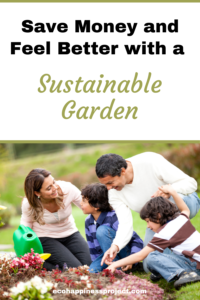This guest post was written by Charlie Fletcher, a freelance writer from the lovely “city of trees”- Boise, Idaho. Her love of writing pairs with her passion for social activism and search for the truth. You can find more of her writing on her Contently.
 If you’ve ever considered growing your own food, now is as good a time as ever to start. Organic fruits and vegetables are typically more expensive at grocery stores than a lot of lower-quality junk food items. This means that growing produce at home can save you money and keep you happy and healthy.
If you’ve ever considered growing your own food, now is as good a time as ever to start. Organic fruits and vegetables are typically more expensive at grocery stores than a lot of lower-quality junk food items. This means that growing produce at home can save you money and keep you happy and healthy.
Whether you have a large outdoor space or just a patio with room for a few plant boxes, you can grow food. This also tends to be more environmentally friendly than industrial vegetable production, so you’re contributing to a greener society while remaining within your budget. Let’s dig a little deeper into how you can save money through sustainable gardening.
Recognize the Benefits
Sustainable gardening certainly takes a lot of work and focus to achieve effectively. Therefore, it can be easy to fall behind. One way to maintain motivation throughout the process is to gain a good understanding of the range of benefits you get from the experience. Some of these are instantaneous, and others will have positive effects over time.
Perhaps most obviously, you will save money on your grocery shopping bills. One report found that an investment of $70 in gardening resources yielded around $600 in vegetables. Also, you may find you save money on gas due to fewer trips to the grocery store. This may represent small savings, but it can certainly add up.
Sustainable gardening also has a direct impact on your wellness. Committing to green activities can improve your quality of life in a variety of ways. The time you spend outside tending to your garden can increase your oxygen intake. Growing your own food also exposes you to fewer harsh chemicals, such as pesticides and industrial fertilizers. Living this mentally and physically healthier life can also translate to fewer costly doctor visits and treatments. A boosted immune system also means you may be less likely to experience lost finances from having to take time off from work.
Plan Mindfully
If you want to save the most money and enjoy the full range of benefits of sustainable gardening, it will require some commitment. Your project will be more efficient, sustainable, and impactful if you make a solid plan.
Identify the range of vegetables that you want to incorporate into your gardening plan. Do some research into how long it takes to grow each type of product, the yields you can expect, and the resources you will need. This allows you to take a mindful approach to eating and gardening, avoiding investing in more seeds, soil, or equipment than you strictly need. It also means you will be reducing potential waste produced from excess items you and your household are unable to consume.
It is also helpful to have to plan for seasonal changes in crops. You can’t always guarantee that you will be able to grow the same items in the spring that you can in the fall. Find suitable replacements for your needs each season. Understanding when to rotate out different vegetables ensures that you don’t have to purchase vegetables from the store to fill supply gaps. From a sustainability perspective, rotating crops seasonally or yearly tends to be healthier for the soil.
Work as a Community
Sustainable gardening isn’t something you necessarily have to do alone. Indeed, you will get the best returns from working as a community. This applies both on a financial basis and in terms of richer local relationships.
This doesn’t have to be a complex operation. It can be a mutual agreement between you and a couple of neighbors, or you can form a whole neighborhood co-op. Get together and plan what types of crops will be grown by each member of the neighborhood and formalize processes for dividing up the produce. This creates opportunities for lower-cost access to a more diverse range of vegetables for everyone involved. More organic gardens in the area can also be beneficial for local pollinating insect populations.
Another positive outcome of approaching this project as a community effort is as an educational resource for neighborhood children. Parents can help children connect to nature. Getting them involved with gardening projects teaches them about sustainability and demonstrates a responsible approach to using natural resources. This time they spend gardening outside can lead to a greater appreciation and respect for the natural world. This also provides children with the knowledge they need to access cost-effective, healthy foods.
Maintaining a sustainable home garden can save you money, keep you healthier, and produce educational opportunities. It’s important to make sure you take a mindful approach to this, planning your crop choices in line with the most appropriate seasons. You may also find approaching this project as a community yields greater efficiency. Whether you are just starting small or creating something more ambitious, growing your own produce will be a financially, emotionally, and culturally enriching experience.





Leave a Reply